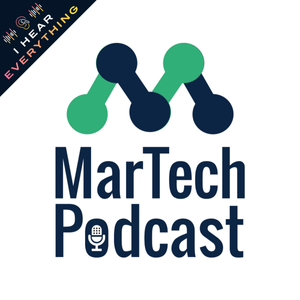
Episode 4: It's a Data Lake, not a Data Public Swimming Pool
04/04/18 • 34 min
Open source activism tends to focus on running on hardware you can trust and avoiding Cloud computing. The problem with some Cloud providers has to do with a conflict of interest between serving customers and how they generate revenue. It’s important for the customer to have control of their computer and their data in the Cloud. But what about their security and privacy?
Today, we’re talking to Kyle Rankin, chief security officer at Purism and writer for Linux Journal. He is a Linux expert who decided to work at Purism because of the company’s belief in free software and the Linux community.
Some of the highlights of the show include:
- Cloud providers have faced challenges when it comes to data privacy and who owns what.
- The word “Cloud” is overloaded, and it is unclear who is in control.
- Cloud providers can sabotage efforts to make programs work together.
- Cloud providers may not troll through data and exploit it. Yet, they develop tools for customers to be able to do that.
- Even though Linux Journal stopped being printed and went digital, and was going under, it’s now back and taking a new approach.
- What matters to new readers and Linux users is now different than what was important to original readers.
- The more time you can spend to understand what’s happening behind the scenes will make you much more marketable and adaptable.
- Kyle explains whether Amazon Linux is becoming a viable concern and if distribution matters anymore. Now, it’s about running an application, not thinking about what it’s running on.
- Are there gangs of Cloud users? Do people look down on Azure users? The target is always moving and changing.
- Check out Kyle’s book, Linux Hardening in Hostile Networks: Server Security from TLS to Tor.
Links:
- Kyle Rankin on Twitter
- Purism
- Kyle Rankin’s book - Linux Hardening in Hostile Networks: Server Security from TLS to Tor
- Linux Journal 2.0 FAQ
- GorillaStack (use “screaming” for discount)
Open source activism tends to focus on running on hardware you can trust and avoiding Cloud computing. The problem with some Cloud providers has to do with a conflict of interest between serving customers and how they generate revenue. It’s important for the customer to have control of their computer and their data in the Cloud. But what about their security and privacy?
Today, we’re talking to Kyle Rankin, chief security officer at Purism and writer for Linux Journal. He is a Linux expert who decided to work at Purism because of the company’s belief in free software and the Linux community.
Some of the highlights of the show include:
- Cloud providers have faced challenges when it comes to data privacy and who owns what.
- The word “Cloud” is overloaded, and it is unclear who is in control.
- Cloud providers can sabotage efforts to make programs work together.
- Cloud providers may not troll through data and exploit it. Yet, they develop tools for customers to be able to do that.
- Even though Linux Journal stopped being printed and went digital, and was going under, it’s now back and taking a new approach.
- What matters to new readers and Linux users is now different than what was important to original readers.
- The more time you can spend to understand what’s happening behind the scenes will make you much more marketable and adaptable.
- Kyle explains whether Amazon Linux is becoming a viable concern and if distribution matters anymore. Now, it’s about running an application, not thinking about what it’s running on.
- Are there gangs of Cloud users? Do people look down on Azure users? The target is always moving and changing.
- Check out Kyle’s book, Linux Hardening in Hostile Networks: Server Security from TLS to Tor.
Links:
- Kyle Rankin on Twitter
- Purism
- Kyle Rankin’s book - Linux Hardening in Hostile Networks: Server Security from TLS to Tor
- Linux Journal 2.0 FAQ
- GorillaStack (use “screaming” for discount)
Previous Episode

Episode 3: Turning Off Someone Else's Site as a Service
How do you encourage businesses to pick Google Cloud over Amazon and other providers? How do you advocate for selecting Google Cloud to be successful on that platform? Google Cloud is not just a toy with fun features, but is a a capable Cloud service.
Today, we’re talking to Seth Vargo, a Senior Staff Developer Advocate at Google. Previously, he worked at HashiCorp in a similar advocacy role and worked very closely with Terraform, Vault, Consul, Nomad, and other tools. He left HashiCorp to join Google Cloud and talk about those tools and his experiences with Chef and Puppet, as well as communities surrounding them. He wants to share with you how to use these tools to integrate with Google Cloud and help drive product direction.
Some of the highlights of the show include:
- Strengths related to Google Cloud include its billing aspect. You can work on Cloud bills and terminate all billable resources. The button you click in the user interface to disable billing across an entire project and delete all billable resources has an API. You can build a chat bot or script, too. It presents anything you’ve done in the Consul by clicking and pointing, as well as gives you what that looks like in code form.
- You can expose that from other people’s accounts because turning off someone else’s Website as a service can be beneficial. You can invite anyone with a Google account, not just ‘@gmail.com’ but ‘@’ any domain and give them admin or editor permissions across a project. They’re effectively part of your organization within the scope of that project. For example, this feature is useful for training or if a consultant needs to see all of your different clients in one dashboard, but your clients can’t see each other.
- Google is a household name. However, it’s important to recognize that advocacy is not just external advocacy, there’s an internal component to it. There’s many parts of Google and many features of Google Cloud that people aren’t aware of. As an advocate, Seth’s job is to help people win.
- Besides showing people how they can be successful on Google Cloud, Seth focuses on strategic complaining. He is deeply ingrained in several DevOps and configuration management communities, which provide him with positive and negative feedback. It’s his job to take that feedback and convert it into meaningful action items for product teams to prioritize and put on roadmaps. Then, the voice of the communities are echoed in the features and products being internally developed.
- Amazon has been in the Cloud business for a long time. What took Google so long? For a long time, Google was perceived as being late to the party and not able to offer as comprehensive and experienced services as Amazon. Now, people view Google Cloud as not being substandard, but not where serious business happens. It’s a fully feature platform and it comes down to preferences and pre-existing features, not capability.
- Small and mid-size companies typically pick a Cloud provider and stick with their choice. Larger companies and enterprises, such as Fortune 50 and Fortune 500 companies, pick multiple Clouds. This is usually due to some type of legal compliance issues, or there are Cloud providers that have specific features.
- Externally at Google, there is the Deployment Manager tool at cloud.google.com. It’s the equivalent of CloudFormation, and teams at Google are staffed full time to perform engineering work on it. Every API that you get by clicking a button on cloud.google.com are viewing the API Docs accessible via the Deployment Manager.
- Google Cloud also partners with open source tools and corresponding companies. There are people at Google who are paid by Google who work full time on open source tools, like Terraform, Chef, and Puppet. This allows you to provision Google Cloud resources using the tools that you prefer.
- According to Seth, there’s five key pillars of DevOps: 1) Reduce organizational silos and break down barriers between teams; 2) Accept failures; 3) Implement gradual change; 4) Tooling and automation; and 5) Measure everything.
- Think of DevOps as an interface in programming language, like Java, or a type of language where it doesn’t actually define what you do, but gives you a high level of what the function is supposed to implement.
- With the SRE discipline, there’s a prescribed way for performing those five pillars of DevOps. Specific tools and technologies used within Google, some of which are exposed publicly as part of Google Cloud, enable the kind of DevOps culture and DevOps mindset that occur.
- A reason why Google offers abstract classes in programming is that there’s more than one way to solve a problem, and SRE is just one of those ways. It’s the way that has worked best for Google, and it has worked best for a number of customers that Google is working with. But there are some other ways, t...
Next Episode

Episode 5: The Last Mainframe with a Kickstart and a Double Clutch
How are companies evolving in a world where Cloud is on the rise? Where Cloud providers are bought out and absorbed into other companies?
Today, we’re talking to Nell Shamrell-Harrington about Cloud infrastructure. She is a senior software engineer at Chef, CTO at Operation Code, and core maintainer of the the Habitat open source product. Nell has traveled the world to talk about Chef, Ruby, Rails, Rust, DevOps, and Regular Expressions.
Some of the highlights of the show include:
- Chef is a configuration management tool that handles instance, files, virtual machine container, and other items.
- Immutable infrastructure has emerged as the best of practice approach.
- Chef is moving into next gen through various projects, including one called, Compliance - a scanning tool.
- Some people don’t trust virtualization.
- Habitat is an open source project featuring software that allows you to use a universal packaging format.
- Habitat is a run-time, so when you run a package on multiple virtual machines, they form a supervisor ring to communicate via leader/follower roles.
- Deploying an application depends on several factors, including application and infrastructure needs.
- It is possible to convert old systems with old deployment models to Habitat.
- Habitat allows you to lift a legacy application and put it into that modern infrastructure without needing to rewrite the application.
- You can ease in packages to Habitat, and then have Habitat manage pieces of the application.
- Habitat is Cloud-agnostic and integrates with public and private Cloud providers by exporting an application as a container.
- Chef is one of just a few third-party offerings marketed directly by AWS.
- From inception to deployment, there is a place for large Cloud providers to parlay into language they already speak.
- Operation Code is a non-profit that teaches software engineer skills to veterans. It helps veterans transition into high-paying engineering jobs.
- The technology landscape is ever changing. What skills are most marketable?
- Operation Code is a learning by experience type of organization and usually starts people on the front-end to immediately see results.
Links:
Nell Shamrell-Harrington on Twitter
Nell Shamrell-Harrington on GitHub
GorillaStack (use discount code: screaming)
.If you like this episode you’ll love
Episode Comments
Generate a badge
Get a badge for your website that links back to this episode
<a href="https://goodpods.com/podcasts/screaming-in-the-cloud-76947/episode-4-its-a-data-lake-not-a-data-public-swimming-pool-9288044"> <img src="https://storage.googleapis.com/goodpods-images-bucket/badges/generic-badge-1.svg" alt="listen to episode 4: it's a data lake, not a data public swimming pool on goodpods" style="width: 225px" /> </a>
Copy




